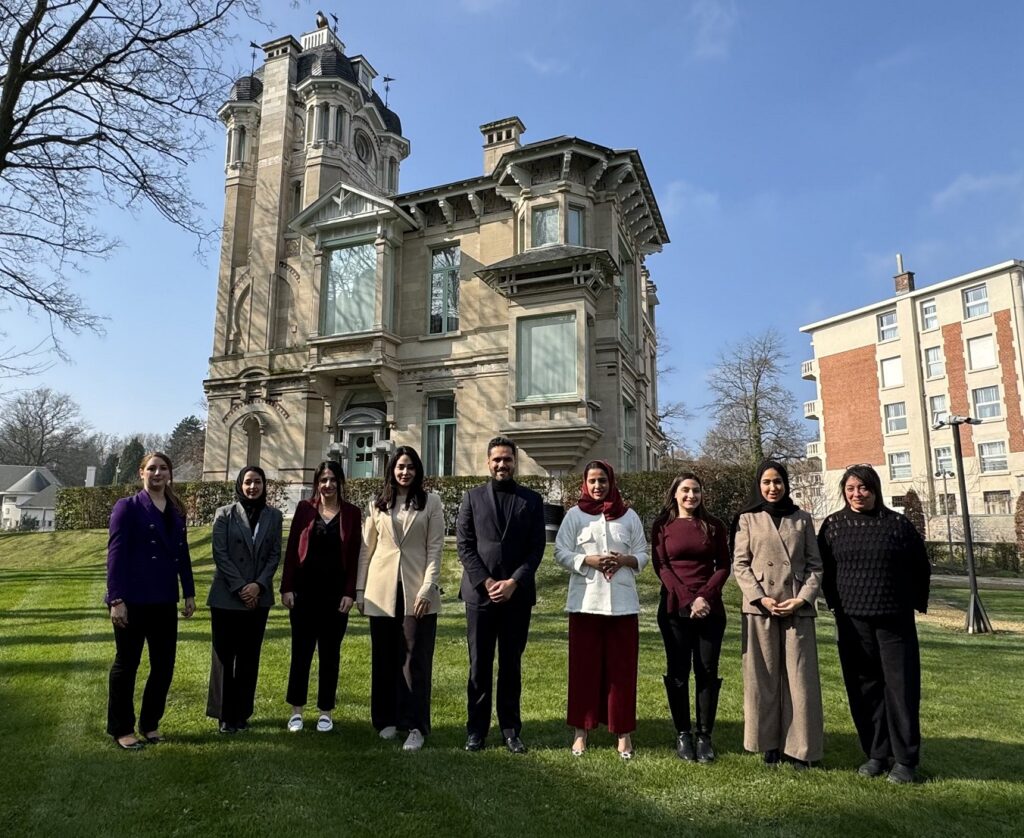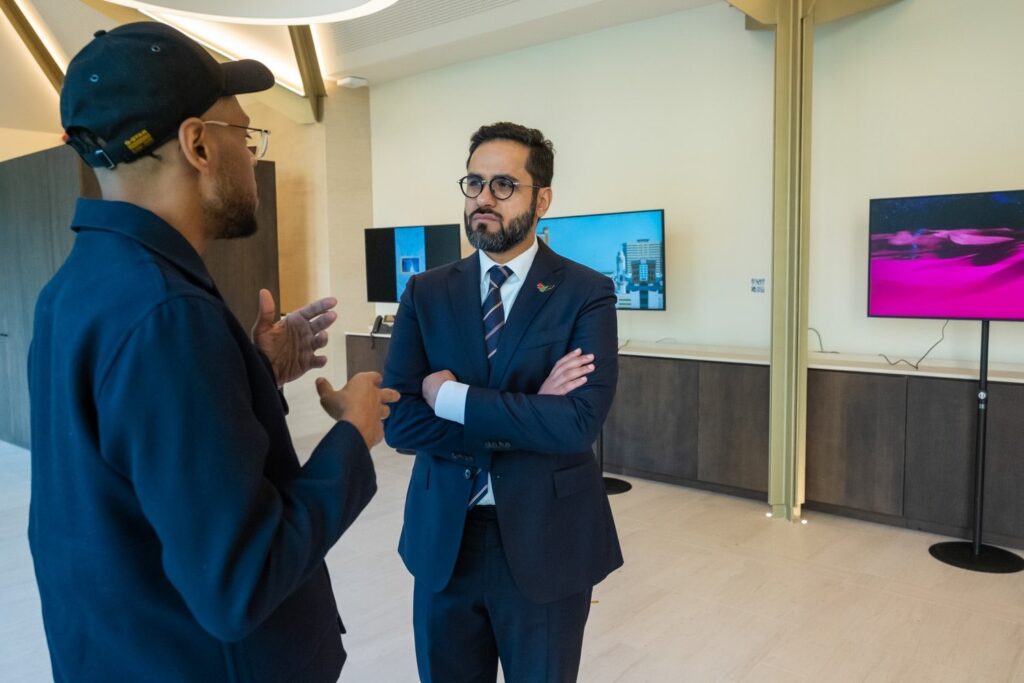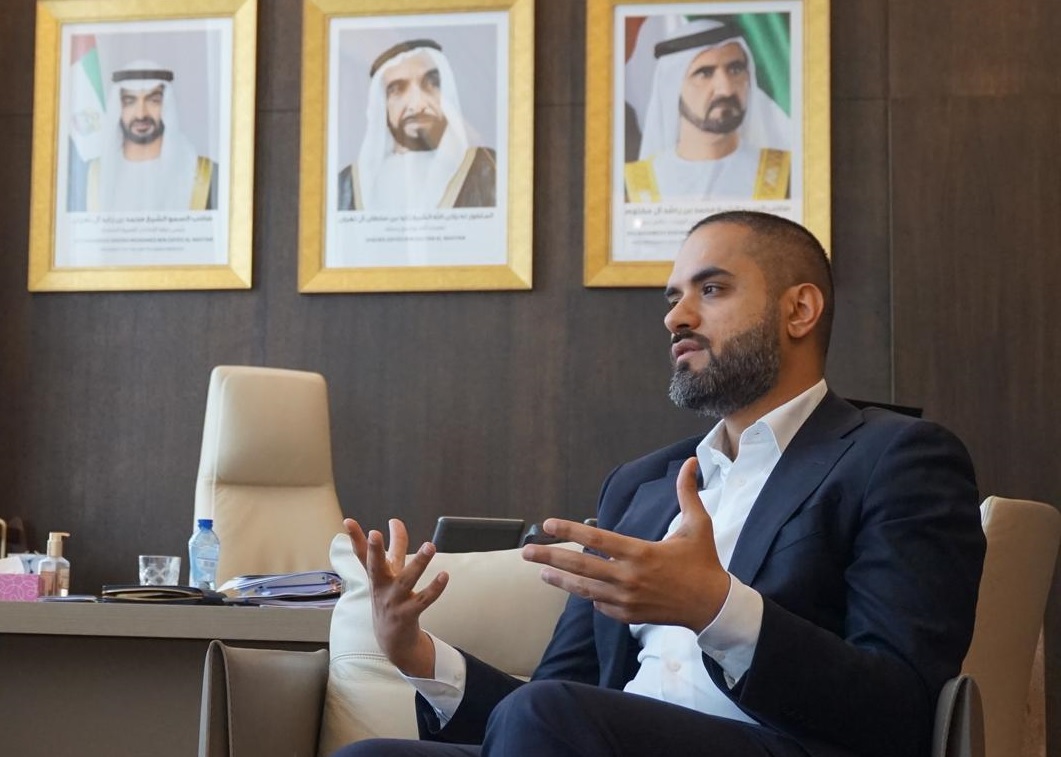When Ambassador Mohamed Al Sahlawi arrived in Brussels in November 2021, the city was still grappling with the challenges of a global pandemic. Stepping into a role that required navigating not only the diplomatic waters of Belgium and Luxembourg, but also the intricate relationships with the European Union, Al Sahlawi brought with him a clear mandate: to promote the United Arab Emirates (UAE) as bridge-builder for global peace, progress and the fight against climate change.
The Maison Delune, an eye-catching turn of the century art-nouveau cultural landmark, plays host to the UAE Embassy, which has quickly grown to become an important part of the wider Brussels diplomatic community.
Under the leadership of Al Sahlawi, who started his diplomatic career as UAE Deputy Head of Mission in Paris and the UAE Deputy Permanent Delegate to UNESCO, the embassy quickly transformed into a dynamic hub for multilateral diplomacy, cultural exchange, and strategic partnerships.
Talking with The Brussels Times from his warm and brightly decorated office, Al Sahlawi set out his priorities for EU-UAE relations, as well as his ambition to to promote peace in the Middle East, champion women's rights, push for sustainable and inclusive innovation and ensure climate talks turn into climate action. “Every single day, we’re trying to find creative ways to institutionalise relationships in areas where there is common interest and shared priorities,” the ambassador explained.
Multilateralism and international cooperation
One of the key pillars of the UAE’s foreign policy in Brussels revolves around multilateralism and deepening ties with the European Union. In his role as ambassador to Belgium, Luxembourg and the EU, Al Sahlawi must juggle many different policy priorities for the UAE, from security cooperation to energy investment, and promoting trade between the UAE and the wider Benelux region.
With its small size, similar to that of Belgium, multilateralism offers a means of impact for the UAE to project itself on the global stage. For instance, to promote the global fight against climate change , the UAE hosted COP28 in Dubai last year. As President and host of this significant climate conference, the UAE spearheaded the diplomatic efforts for a global agreement – the UAE Consensus- to shift away from fossil fuels, gaining the support of most major climate partners, including the EU.
“Hosting COP in the UAE, a country that is still perceived by many as a so-called petrostate, sends a very strong message and signal to the world. If we can do it, everyone can do it,” he said, referring to the UAE’s ambitious climate targets and efforts to transition away from fossil fuels.
In Brussels, Al Sahlawi continues this targeted approach, strengthening relationships with key EU institutions, as well as Belgium and Luxemburg, ensuring daily that the UAE remains a dynamic and active partner.

Ambassador and staff in front of the embassy
“When you look at the bilateral relationship with Belgium, the UAE is the largest trading partner for Belgium in the region. The UAE is home to the largest Belgian community in the Middle East and North Africa,” the ambassador told The Brussels Times.
"You have to find ways to institutionalise the relationship with Belgium and Luxembourg, but also with the EU institutions. We are far away, so we can easily be missed… If you look at the EU, it’s a champion of multilateralism, which aligns perfectly with the UAE’s interests in maintaining a stable international system. We just need to ensure this is perceived and understood accurately.”
One of the most active areas for the ambassador is security cooperation. The UAE, develops programs to combat extremism both in Europe and the Middle East, through initiatives such as the one spearheaded by the Hedayah Center of Excellence. These types of projects are often carried out in collaboration with the EU and receive significant European investment.
On judicial cooperation, the ambassador remarked that relations were “going in the right direction”, with the two partners actively engaging on the topics of extradition and intelligence sharing. Many member states have bilateral agreements with the UAE, with law enforcement services collaborating closely.
Al Sahlawir also pointed to initiatives like the India-MiddleEast-Europe Corridor (IMEC) as an example for the future of trade and strategic links between Europe and the Middle East, both in terms of peace and prosperity. The idea is that deeper integration on the economic and trade level improves the likelihood of lasting peace.
Promoting a global peace agenda
The UAE’s positioning as a global peace partner has been reinforced through its collaborative efforts with the EU on both the humanitarian and security fronts.
The efforts are part of a broader strategy that seeks to foster regional integration to promote long-term peace, the ambassador explained.
In practice, this vision is being implemented by the UAE whose “humanitarian efforts, under the leadership of President His Highness Sheikh Mohamed bin Zayed, are a testament to our nation's deep-rooted values of compassion and solidarity,” said Al Sahlawi. The embassy’s work in coordinating international aid efforts, such as establishing a maritime corridor to deliver essential supplies to Gaza, demonstrates its proactive stance on global humanitarian challenges, he believes.
For instance, as of 27 August 2024, the UAE had sent 3 Maritime aid deliveries via Cyprus, alongside 40,000 tons of urgent supplies via eight aid-ships, 1,300 trucks and 418 flights, 104 airdrops of aid with 3,450 tons, and constructed 6 plants producing 1.6 million Gallons of drinkable water per day for the people of Gaza.
Advocacy efforts also play a key part in the Embassy’s day-to-day work. In addition to the operational aspects of addressing urgent humanitarian needs, particularly in Gaza, the Embassy is also keeping up pressure on counterparts for a peaceful resolution to the conflict, and diplomatic solutions.
Al Sahlawi also emphasised the UAE’s role in global peace efforts through its significant contributions to development aid more generally - another pillar of its partnership with the EU. “We are both, the UAE and the EU, the largest aid and development donors in the world,” he noted. The ambassador is particularly focused on ensuring that aid is not just financial, but also well-governed and strategically directed: “The money is the easiest part, but then governing those funds in recipient countries, that’s where we are having a lot of discussions with the EU and the member states.”
Advancing women’s rights and empowerment
One of the key priorities for the UAE’s diplomatic presence in Belgium and the EU is empowering women world-wide. “For more than 15 years, we’ve been involved in initiatives encouraging women in peace and security, promoting their inclusion in peace processes, protecting women in conflict areas, and ensuring women’s representation in multilateral forums,” the ambassador said.
For instance, we celebrate Emirati Women’s Day every year on August 28. It is a unique holiday observed to recognize Emirati women's efforts and to honor their devotion, fortitude, dreams, and accomplishments in shaping the United Arab Emirates.
In Afghanistan, for example, the UAE has a decades-long history of partnership focused on empowering women, investing in projects which prioritise the cultural and everyday-life experience of Afghan women.
“Working on the ground, we realised that there were a lot of NGOs tackling women's issues, but not always empowering Afghan women. When our teams spoke to women on the ground, they said that first and foremost, they needed a job, and to be more independent,” the ambassador recounted.
“Through our fieldwork, we discovered that women in Afghanistan are the ones sewing Afghani carpets – they are the ones with the ancestral skills and knowledge passed on by generations. We created a whole program around that, the Fatima Bint Mohamed Bin Zayed Initiative, allowing women to own their own businesses in secure ways, and to sell their products on the international market.” While this work has become more challenging under the current governing environment, the UAE remains closely engaged to ensure that Afghan women’s rights remains on top of the international agenda.
Women’s empowerment is playing an increasing role in the UAE’s domestic and international agenda. This shift is noticeable even in the UAE’s presence in Brussels. In Al Sahlawi’s embassy, the majority of the staff are women. Similarly, in the UAE’s Foreign Ministry, 52 percent of staff are female, many of whom in senior positions, ambassadors or ministers. “The empowerment of women has always been a top priority since the unification of the UAE in 1971,” the ambassador affirmed. “It’s something we’ve focused on through both legislation and social programs.”
In the same vein, Al Sahlawi explained how the discussion on women’s empowerment in the UAE has evolved beyond basic rights. He noted: “the discussion has tremendously shifted” to more forward-looking issues like leadership in technology and entrepreneurship. All this, put into the context of the region, is nothing short of revolutionary.
Cultural diplomacy and the power of NFTs
The ambassador is a fan of the arts, but his collection is far less tactile than other collectors. Al Sahlawi is a big supporter of non-fungible tokens (NFTs), a type of digital art traded on the blockchain. The ambassador has leveraged his interest to help shape Emirati cultural diplomacy with Belgium, Luxembourg and the EU, using digital art to help build bridges.
The embassy’s participation in Brussels’ Heritage Days and the launch of a digital and NFT art exhibition titled "Geopoetics of the UAE" are just a few examples of how the UAE is blending tradition with technology to reach wider audiences.
“With NFTs, you can bring artists from around the world, who cannot travel and exhibit them here in Europe. It gives more room for artists to be creative and tackle issues that cannot usually be addressed,” he said. The exhibition transformed digital art into a platform for cross-cultural dialogue, bringing together EU and Emirati artists and creating new avenues for artistic expression.

The ambassador discussing with a young artist from the UAE during an exhibition on NFT artworks at the embassy
The relationship between arts and diplomacy goes beyond what we see. “Belgium”, the ambassador pondered, “has massive untapped potential when it comes to promoting its culture abroad. Many Emiratis are unknowingly exposed to Belgian cultural products every day”.
“I grew up at a home where the roads were built by B6, a Brussels-based company, while watching The Smurfs, and my mom having her tea with the lotus speculoos,” the ambassador laughed. He hopes that digital art projects, especially with Belgium’s strong comic book culture, could facilitate deeper cultural exchanges between the UAE and Europe, but also deeper understanding of one another, and of their similarities.
Looking ahead: Priorities for UAE-EU relations
As the UAE and the EU continue to build on their partnership, the ambassador identified several key areas for potential development. Trade and economic diversification remain high on the agenda, with both sides eager to explore opportunities in sectors like clean energy, advanced technology, and healthcare.
The ambassador also emphasised the need for institutionalising trade relationships to ensure long-term collaboration: “We’re both big trading hubs in our regions, and we see eye to eye on a lot of things because we’re usually competing with bigger countries”
Climate action is another priority. The embassy has continued contacts with EU institutions as well as Belgian and Luxemburgish counterparts regarding the green transition. Al Sahlawi said that Emirati energy companies, especially in the renewable energy field, had much to learn from smaller energy firms in Belgium. The UAE was an early investor in renewable energy and is determined to cement this leadership position.
Sahlawi concludes: “For us, ensuring that multilateral diplomacy works is not just a priority; it’s a necessity - given the challenges in our region.” The recent visit of Ursula von der Leyen to the UAE, and growing alignment on energy and geo-politics, are all signs that the role of the Embassy is likely to expand over the course of the next decades. The ambassador is convinced that his nation will continue to deepen its ties with the EU member states, not only for the mutual benefit of both regions, but for that of his whole region, pushing for stability, cooperation and above all, an honest dialogue between two strong partners.

